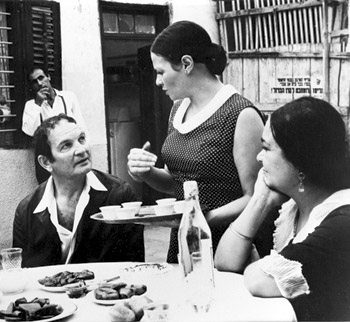Moshe Mizrahi’s The House on Chelouche Street, released in 1973, is an Israeli classic nearly four decades on.
An Academy Award nominee for best foreign film, it’s scheduled to be screened by the Toronto Jewish Film Society on Jan. 22 at the Al Green Theatre (750 Spadina Ave.) at 4 p.m. and again at 7 p.m.
The film, slightly less than two hours in length, unfolds in Hebrew, Ladino and Arabic. It’s set in 1947 in pre-state Israel and is essentially an exercise in nostalgia.
The protagonists are Sephardi Jewish immigrants from Alexandria, Egypt. No reason is given why they left. Accustomed to a pampered lifestyle with servants at their beck and call, they now eke out a meagre existence in a poorer neighbourhood of Tel Aviv.
Clara (Gila Almagor), a widow with four children to support, works as a maid to make ends meet. She has seen better days, as her mother, aunt, uncle and sister-in-law can attest.
Sami (Ofer Shalhin), Clara’s 15-year-old dutiful son, is the only spark of joy that lights up her otherwise drab life. She has faith in his ability to make something of himself and do her proud.
Nissim (Joseph Shiloach), a randy bachelor who roars around town on a motorcycle, ardently pursues Clara. But she rebuffs his overbearing overtures. “I’m through with love,” she says with a note of resignation in her tired voice.
A friend introducers Clara to a suitable suitor, but she is torn by doubts, even as Sami practically begs her to reconsider.
Dropping out of school, Sami finds a job in a workshop, but a strike by disaffected employees upends his dream of easing his mother’s financial problems.
Being a typical teenager, Sami tries to relieve his lust with a female acquaintance, but she is not a willing partner.
By chance, he meets Sonia (Michal Bat-Adam), an attractive woman 10 years older than himself. By turns platonic and tender, their relationship is ultimately problematic. Their love-making scenes are beautifully rendered.
Sami’s decision to join the Irgun, a right-wing Jewish militia, disappoints Clara, who doesn’t quite understand that the country is heading toward war.
The film brims with background tension. Rifle-charging British soldiers raid the homes of suspected Jewish rebels. Bombs explode in the distance. Young Jewish men enlist in the Haganah as the approaching armed struggle over Palestine simmers.
Almagor, a star of the Israeli cinema, delivers a subtle yet powerful performance as a woman under duress.
Shalhin’s portrayal as a teen who’s mature beyond his years is quite convincing.
Portraying a kibbutznik who has left her husband for a new life in the city, Bat-Adam exudes both demureness and smouldering sexuality.
The House on Chelouche Street takes a viewer back to an era when life in Israel seemed simpler, yet more complex, and when the Jewish state was still an embryonic idea rather than a vital reality.
